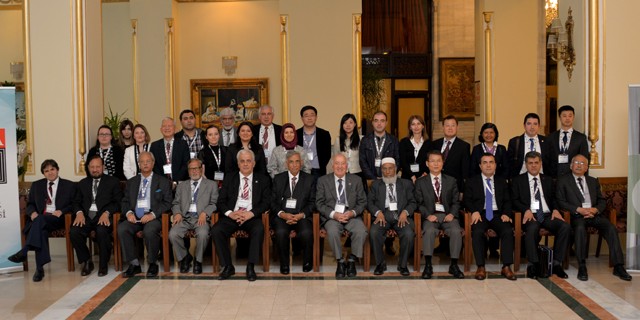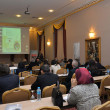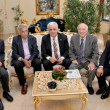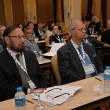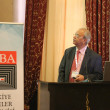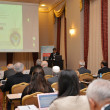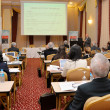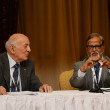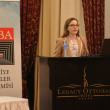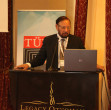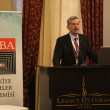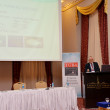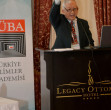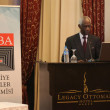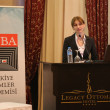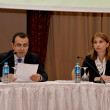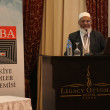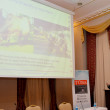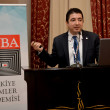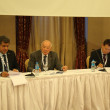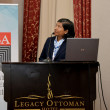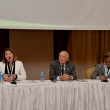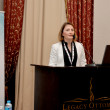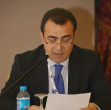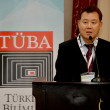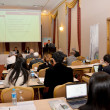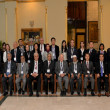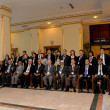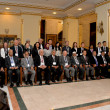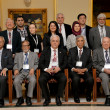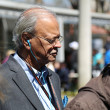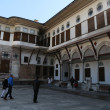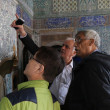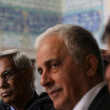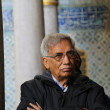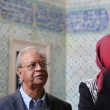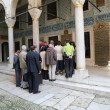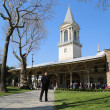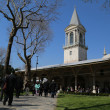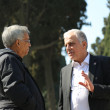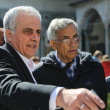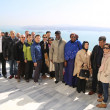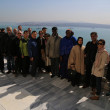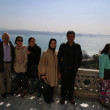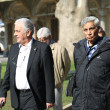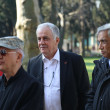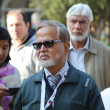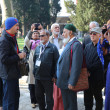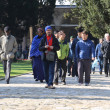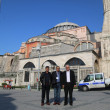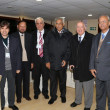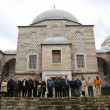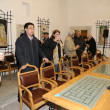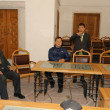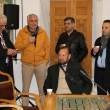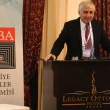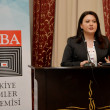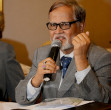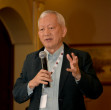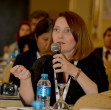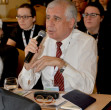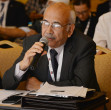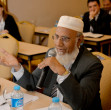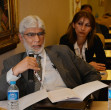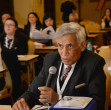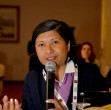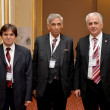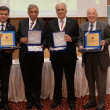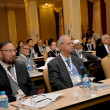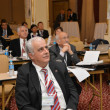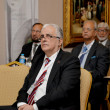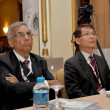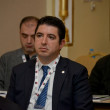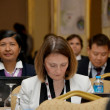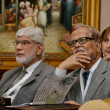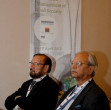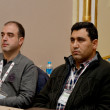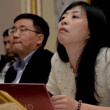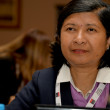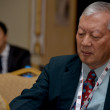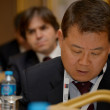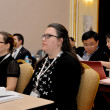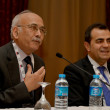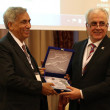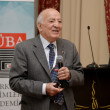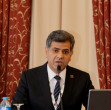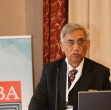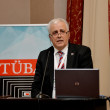The ‘International Regional Workshop on Sustainable Management of Food Security’ Organized through Cooperation Between TÜBA and AASSA Took Place
TÜBA and The Association of Academies and Societies of Sciences in Asia – AASSA with the contributions of the Global Network of Science Academies –IAP organized the “International Regional Workshop on Sustainable Management of Food Security" held on April 9-10, 2015 at the Legacy Ottoman Hotel.
TÜBA President Prof. Dr. Ahmet Cevat Acar said: “I am confident that we will witness a workshop that will achieve very valuable results.”
In the speech by TÜBA President Prof. Dr. Ahmet Cevat Acar, he started out by expressing his pleasure in seeing valued speakers from all over the world come together in Istanbul and continued by speaking about the “Workshop on Women in Science and Technology” that was organized last year by AASSA and TÜBA and thanked AASSA President Prof. Dr. Krishan Lal for providing the opportunity to realize these valuable organizations. Prof. Dr. Acar also said “The organization committee has put forth great effort to make the workshop happen. I want to express my gratitude to the AASSA Deputy President Prof. Dr. Namık Kemal Aras and the AASSA Secretary. For two days very important presentations on food and its sustainable management, the effects of nature and humans on food security, conditions and nutrition will be presented by valued scientists. I am confident that we are all witnesses to a workshop that will achieve very valuable results” and concluded by providing information about TÜBA.
AASSA President Prof. Krishan Lal: “Food sustainability and nutrition is creating great concern in the Asia Pacific region”
Prof. Dr. Lal, who started his speech by thanking various individuals who had undertaken responsibility at every stage of the organization, continued: “The Sustainable Management of Food Security, which is the subject of the seminar, is very important in the present global scenario especially due to the rise in population and climate changes. There are many debates taking place at UN level. National science academies like TÜBA are looking into the issue from its different aspects both individually and together with organizations like the International Council for Science (ISCU) and IAP, to prepare strategies to overcome this problem. Food sustainability and nutrition are problems that create great concern in the Asia Pacific region because almost half of the world’s population is living in this region. Therefore this issue is a very important one on the agenda for AASSA.
Recently many important developments have taken place. Previously the IAP and Inter-Academies Medical Panel (IAMP) united to form the Inter-Academies Partnership also under the abbreviation of IAP. There is a possibility that the Engineering and Technology Academies Council will also join this partnership in the near future. A large project called “Agriculture, Food and Nutrition Security” sponsored by the German Government has just started. All of the regional networks of the IAP are participating in the implementation of the project. The AASSA has assigned for specialists to the project crew. The start-off meeting for the project will be held on June 1-2, 2015 at the German National Science Academy located in Halle. This workshop that will last for two days within this scope is of great significance. I am anxiously awaiting the beneficial documents that will be generated by these discussions.”
TÜBA Food and Nutrition Study Group Coordinator Prof. Dr. Kazım Şahin said: “While global climate changes and environmental pollution is continuing faster than ever, many regions are being impacted by drought and famine”
TÜBA Principle Member and coordinator of the TÜBA Food and Nutrition Study Group, Prof. Dr. Kazım Şahin started his speech by drawing attention to the fact that a large portion of the world population is suffering from and struggling with famine. Prof. Dr. Şahin continued as follows: “While global climate changes and environmental pollution is continuing faster than ever, many regions are being impacted by drought and famine. Scientists are emphasizing the importance of alternative and adaptable food production systems to reduce the possibility of encountering even greater food shortages and to prevent the risks that could occur in the near future, and are continuing research on these subjects. In the workshop at the forefront of all this research, we will take a look at food system operations like the processing, distribution and consumption of food, producing food from crops, livestock, trees, freshwater and sea water sources; the existence, access, use and reliability dimensions of food security; issues concerning the economy, environment and health, social goals and the synergy and balances between these.”
AASSA Deputy President Prof. Dr. Namık Kemal Aras: “AASSA is making its voice heard from Manila to İzmir with the work it is achieving”
In the speech by TÜBA Honorary Member and AASSA Deputy President Prof. Dr. Namık Kemal Aras he emphasized that the AASSA is an organization that deals with science and technology and is a nonprofit international organization aiming to be a society that plays an important role in developing the science and technology of the Asian and Australian regions. Prof. Dr. Aras, explained that AASSA focuses on issues like science education in ‘Asia and the Pacific’, women in science and engineering, science literacy: transmitting science and science communication and economical advancement with science, technology and innovation’ and added that the organization has made its voice heard with seminars, conferences and studies in many different regions and cities from Jerusalem to New Delhi, from Manila to Izmir.
After the opening speeches TÜBA President Prof. Dr. Ahmet Cevat Acar presented plaques of acknowledgement to AASSA President Prof. Dr. Krishian Lal, TÜBA Food and Nutrition Study Group Coordinator Prof. Dr. Kazım Şahin and AASSA Deputy President Prof. Dr. Namık Kemal Aras for their cooperation and contributions.
After a break for lunch; following the session titled “Sustainable Freshwater Aquaculture for Food Security in the Rural Areas of Asia” presented by Dr. Zahurul Karim and Rafael D. Guerrero III under the Presidentship of Prof. Dr. Namık Kemal Aras, Assoc. Prof. Dr. Işıl Ergin presented a very interesting presentation on “Genetically Modified Organisms and Risk Perception: Comparison of Advantages and Risks” under the Presidentship of İrfan Erol, Food and Control General Manager of the Ministry of Agriculture, Food and Livestock and Nana Bolashvili.
Prof. Dr. Hyun Jin Park’s “Prospective and Strategic Food Security Plan for the Unification of Korea”, Prof. Dr. Amin Alizadeh’s “Food Security and Food Production Capacity in Connection with the Country’s Limited Freshwater Sources in Iran” and Assoc. Prof. Dr. Esra Çapanoğlu Güven’s “Changes in the Content and Bioavailability of Antioxidants Used in the Processing of Foods” presentations were presented under the moderating of Erol and Bolashvili.
In the session by Prof. Dr. Faruk Bozoğlu and Prof. Dr. Yin Li titled “Creating a Power in Bio-Based Production: Towards a Sustainable Bio-Economy”, Dr. Kanti Shrestha’s presentation on “The Impact of Climate Changes on Himalayan Biodiversity” and Assoc. Prof. Dr. Mehmet Ulaş Çınar’s presentation titled “The Impact of Farm Animals' Genome on Food Safety and Sustainability” were presented.
On the second day of the workshop that began at 9:30 was opened with the session ‘The Impact of Environmental Endocrine Inhibiters on the Development of Obesity” under the Presidentship of Hyun Jin Park and continued with Khalid Mahmood Khan’s presentation on ‘Changing Climate Conditions – A Threat to the Agricultural Environment and Food Security in Pakistan’. The ‘Approaches to Achieving Food Security in the Climate Change Era’ session took place under the Presidentship of Prof. Dr. Kazım Şahin and Riaz Hussain Qureshi with the presentation of ‘Food Antioxidants: Precautions and Identification’ by TÜBA Council Member Prof. Dr. Reşat Apak, Faruk Bozoğlu’s ‘The Impact of Climate Changes on Food Security’ and Mohsin Iqbal’s ‘The Threats to Agriculture and Sustainable Development by Climate Change’.
After the lunch break; the ‘The Trends of Temperature and Rain Patterns in Rice Productivity in Nigeria and a Location Based Analysis’ session under the Presidentship of Ali Aydın and Yin Li continued with Dilvin İpek’s presentation on ‘The Importance of Biofilms on the Sustainability of Food Security’. The ‘Increase of Food Security in Sensitive Regions of Bangladesh in Terms of Climate’ session continued under the Presidentship of Prof. Dr. Reşat Apak, Kanti Shrestha and Zahurul Karim and included Nana Bolashvili’s presentation on ‘Water Management Problems In Line With the Existing Climate Change’, Seda Özdikmenli’s ‘The Role of Educating Farmers on Hygiene In Terms of the Sustainable Security of the Dairy Industry: A Sample Study from the Çanakkale Region of Turkey’, Muhammed Abdul Hamid Miah’s ‘Technological Packages to Reinforce the Sustainability of Food Production in Bangladesh’ and Ousmane Kane’s ‘The Management of Science, Technology and Innovation to Encourage Sustainable Food Security in Africa: Possibilities for Partnerships in Other Regions’.
At the end of the workshop Prof. Dr. Kazım Şahin, Prof. Dr. Namık Kemal Aras and Prof. Dr. Hyun Jin Park discussed the report to be prepared after the workshop and the final notes on the meeting were entered on record.

